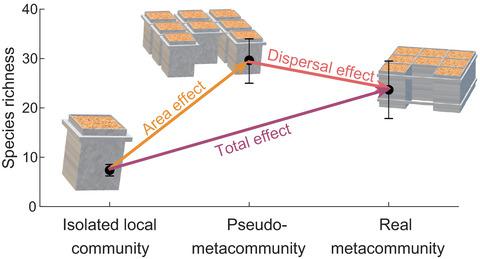Our official English website, www.x-mol.net, welcomes your
feedback! (Note: you will need to create a separate account there.)
Disentangling the mechanisms underlying the species–area relationship: A mesocosm experiment with annual plants
Journal of Ecology ( IF 5.3 ) Pub Date : 2020-07-27 , DOI: 10.1111/1365-2745.13476 Eyal Ben‐Hur 1 , Ronen Kadmon 1
中文翻译:

解开物种与区域关系的潜在机制:一年生植物的中观实验
更新日期:2020-07-27
Journal of Ecology ( IF 5.3 ) Pub Date : 2020-07-27 , DOI: 10.1111/1365-2745.13476 Eyal Ben‐Hur 1 , Ronen Kadmon 1
Affiliation

|
- The increase in species richness with increased island area is one of the most widely documented patterns in ecology and biogeography but its mechanisms are still under debate. Disentangling these mechanisms in natural systems is challenging due to various kinds of confounding effects.
- Here we use a novel mesocosm experiment focusing on annual plants to disentangle the effects of two mechanisms that may lead to higher richness on large islands: increasing population sizes and increasing opportunities for within‐island dispersal. Theoretical studies show that both mechanisms may contribute to higher richness on large islands, but no previous study has attempted to separate their effects. We also test an alternative, ‘null’ hypothesis, according to which the only mechanism underlying the increase in richness with increased area is a pure sampling effect (the ‘passive sampling hypothesis’).
- As expected, increasing area had a strong positive effect on species richness. However, the main mechanism underlying the difference in richness between small and large islands was passive sampling. Moreover, our results indicate that dispersal had a negative rather than positive effect on island richness.
- Synthesis. Our results corroborate previous observational studies that failed to reject the passive sampling hypothesis. However, in contrast to previous studies, our findings are based on experimental manipulations of island area, under controlled uniform conditions, at small spatial scales that facilitate within‐island dispersal and in three independent systems that differed in resource availability and disturbance. These findings emphasize the need for a careful examination of sampling effects in future research of the species–area relationship.
中文翻译:

解开物种与区域关系的潜在机制:一年生植物的中观实验
- 随着岛屿面积的增加,物种丰富度的增加是生态学和生物地理学上记录最广泛的模式之一,但其机制仍在争论中。由于各种混杂效应,在自然系统中解开这些机制具有挑战性。
- 在这里,我们使用一种针对年生植物的新颖的介观实验,来弄清楚可能导致大岛屿富裕的两种机制的影响:种群数量的增加和岛内扩散的机会增加。理论研究表明,这两种机制都可能有助于提高大岛的富裕程度,但以前没有研究试图将其影响分开。我们还测试了另一种“零”假设,根据该假设,富裕度随面积增加而增加的唯一机制是纯采样效应(“被动采样假设”)。
- 不出所料,面积的增加对物种丰富度具有强烈的积极影响。然而,小岛和大岛之间的丰富度差异背后的主要机制是被动采样。此外,我们的结果表明,分散对岛屿的丰富程度具有负面影响而不是正面影响。
- 综合。我们的结果证实了先前的观察性研究,这些研究未能拒绝被动抽样假设。但是,与以前的研究相比,我们的发现是基于在受控的均匀条件下,在较小的空间尺度上有利于岛内扩散的实验性岛区操纵,以及在三个不同的资源可利用性和干扰性的独立系统中进行的。这些发现强调了在物种与区域关系的未来研究中需要仔细检查采样效果的必要性。










































 京公网安备 11010802027423号
京公网安备 11010802027423号